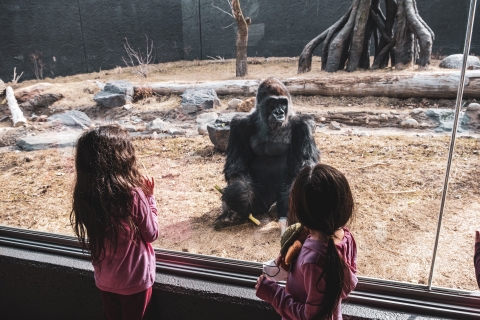Predicting the preferences of others is a skill observed in human children, but not in great apes, a new study from the University of Portsmouth has found.
These findings support the hypothesis that recognising the preferences of others, even when they differ from our own, is a uniquely human trait.
Researchers investigated if children and great apes could predict the food choices of others based on the person's preferences. They tested 71 children aged from five to 11 years from Namibia, Germany, and Samoa, and 25 great apes from four species: chimpanzees, bonobos, gorillas and orangutans.

Children looking at a gorilla in a zoo
Before the experiment, a preference assessment phase determined the favourite and least favourite food options for each participant. For children, it was sweets or chocolate, pretzels or nuts, and dried tomatoes. For apes, it was bananas or pasta, carrots or cucumber, and eggplant or radish.
During the experiment children and apes were partnered with an adult. Each participant had seen the adult's food preference first, and was then asked to choose one of three snacks, after the adult had made a selection in private.
Children refrained from choosing their preferred option when matched with an adult who shared their preference, to increase their chances of getting what they wanted. But they selected their favoured food when the adult's preference differed from theirs.
The non-human great apes in the study consistently chose food items based on their own preferences, regardless of the adults' choices, which starkly contrasted with the adaptive-decision making observed in the human children.
Dr Juliane Kaminski, Associate Professor in Comparative Psychology
The apes on the other hand, just picked their favourite snack, no matter what the adult preferred. The results suggest that understanding and considering what others might like, even if it's different from what we like, is something special to humans.
The study also found that children from various cultures all considered the adult's preferences, showing that flexibility in decision-making and understanding others' desires is a culturally universal trait among humans.
Lead author, Dr Juliane Kaminski, from the University of Portsmouth's Department of Psychology, said: "One key aspect of human social cognition is understanding and making inferences about others' mental states, such as their perceptions, knowledge, beliefs, desires and preferences, which is known as 'theory of mind'. Our results suggest that the tendency to anticipate others' preferences is cross-culturally robust and, among the great apes, most likely specific to humans.
"The non-human great apes in the study consistently chose food items based on their own preferences, regardless of the adults' choices, which starkly contrasted with the adaptive-decision making observed in the human children."
The research is published today in PLOS ONE.






